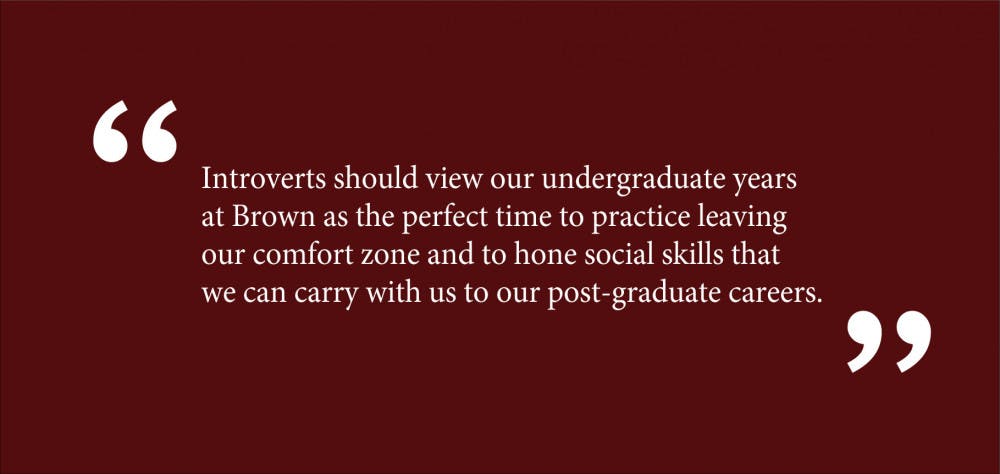The social environment at Ivy League universities and other top colleges is one where extroverts typically thrive. First off, the admissions process necessarily selects for students who are comfortable sharing personal details about their lives for strangers to evaluate, both in their essays and their alumni interviews. Once on campus, students with strong interpersonal skills can excel. It is the extroverts who have an easier time creating large social networks, becoming club leaders, forming relationships with professors and impressing on-campus recruiters. In this environment, introverts like me may feel that we are at a disadvantage, since the instinct to put ourselves out there does not come naturally. But instead of being deterred, we should recognize the myriad opportunities we have for personal growth. Introverts should view our undergraduate years at Brown as the perfect time to practice leaving our comfort zone and to hone social skills that we can carry with us to our post-graduate careers.
Interpersonal skills are essential to any career. Whether you go into academia or investment banking, you will not be able to avoid giving research talks, presenting findings or year-end reports and spearheading meetings. You will have to reach out to and form connections with colleagues, higher-ups and people outside of your organization. While extroverts may have the upper hand, introverts can make active efforts to become more comfortable doing all of these things.
Undergraduate years at an Ivy League university are the best time to develop these skills. There are many networking events, and the strong alumni community is almost always happy to help out current students. Student organizations offer countless opportunities to contribute meaningfully to communities of peers. Though we introverts may have to seek these opportunities out ourselves — which can seem daunting — in the long run, leaving our comfort zones will be nothing but beneficial. We will be pushed out of our comfort zones all throughout life, so we might as well practice it in a low-stakes environment of fellow students.
When I first arrived at Brown, I was overwhelmed by the social environment. But I have been pushing myself in various ways, joining fun and social clubs and assuming leadership positions that encourage collaboration with my peers. While I still consider my social confidence a work in progress, I have made huge strides toward being able to take on any social situation in which I find myself.
Working up the courage to take initiative in developing communication skills is difficult, but I almost always do so because I admire my peers and take inspiration from their willingness to speak to and engage with others. I have often found it difficult to be more outgoing in certain situations while still being myself. But the challenge has been gratifying.
It is also critical to note the difference between introversion and social anxiety, although one person can be characterized by both. I do not want to speak on behalf of those with social anxiety, nor give the wrong impression that merely putting oneself out there is sufficient for treatment. While introversion may involve a tendency to be shy, social anxiety can be crippling, making social interactions a challenge to get through and nearly impossible to initiate. I admire those who suffer from social anxiety for their courage, especially those in incredibly social environments like Brown. I merely speak for introverts who may feel that at achieving institutions like this, the odds are stacked against them.
While extroverts may always occupy the spotlight of attention, I have connected with many others like me during my time at Brown. Even though it may not seem that Brown has room for introverts, we should recognize that we are more represented than we might initially appear; we are just good at camouflaging into a social environment.
At Brown, an introvert can stay in their comfort zone and keep to themselves, or they can partake in extroverted activities. I’ve thankfully never felt like Brown was trying to shape me into something I’m not; I have just felt that it was pushing me to go places I have never gone before.
While I cannot speak for everyone at Brown, I do believe there is a niche for everyone out there, extroverted or introverted. Brown sees us for who we are and appreciates it; it invites us to be part of its community, no matter our various personalty types. Every networking event, final presentation and mixer give us the interpersonal skills we need to prepare us for our careers beyond Brown. The Ivy League might provide extroverts the opportunity to thrive, but it can also provide us introverts the invaluable tools we need for navigating an extroverted world.
Rachael Schmidt ’21 can be reached at rachael_schmidt@brown.edu. Please send responses to this opinion to letters@browndailyherald.com and op-eds to opinions@browndailyherald.com.





